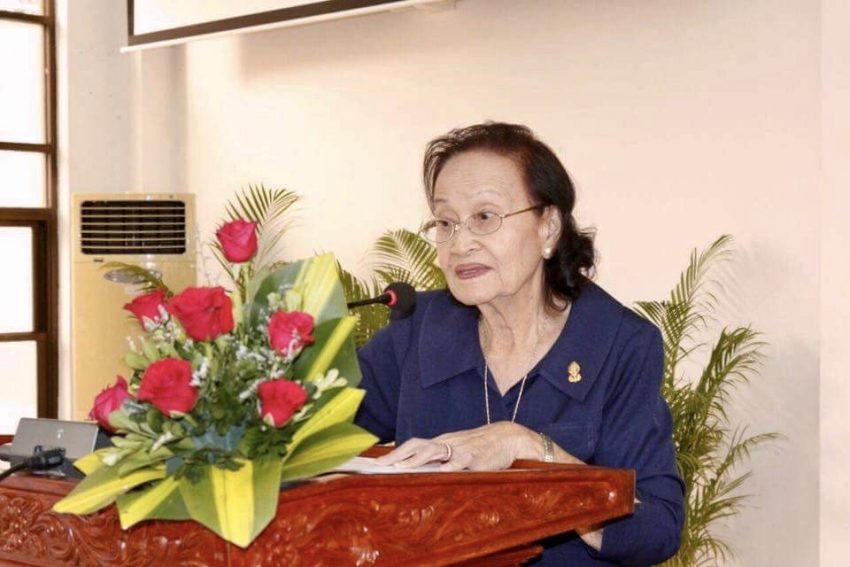Training on “Administration and Organization of Parliamentary Work” organized jointly by the Parliamentary Assembly of the Francophonie (APF) – Cambodian Section, the Parliamentary Institute of Cambodia and Senghor University, held from 9 to 14 October 2017 at the Senate
A training course on the Administration and Organization of Parliamentary Work ran from 9 to 14 October presided over by Her Excellency Ty Borasy, Chairperson of the Commission on Foreign Affairs, International Cooperation, Media and Information, and His Excellency Pol Ham, Chairperson of the Commission on Planning, Investment, Agriculture, Rural Development, Environment and Water Resources. They were acting in their role as the Vice-Chairpersons of the Parliamentary Assembly of the Francophonie (APF) – Cambodian Section. This training was attended by members from all political parties in the Parliament, the management and officials of the General Secretariat of the National Assembly and of the Senate, parliamentary staff from Lao PDR, Vietnam and Thailand, and representatives from various embassies and international organizations. Those attendees, along with representatives from Senghor University and from the Parliamentary Assembly of the Francophonie, brought the number of participants to around 80.
Mr. Dararith Kim Yeat, Executive Director of the Parliamentary Institute of Cambodia (PIC), warmly welcomed participants and gave a brief summary of the background, values, mission and strategies adopted by his organization. Highlighting PIC’s mission in the regional context, and in particular with countries in the region who were in a post-conflict phase, he expressed PIC’s determination for close collaboration to build peace and stability.
He continued that, in countries that are post-conflict, information used to develop public policies could be biased and the recruitment of civil servants sometimes had to respond to the principles of national reconciliation in order to ensure that all parties were included in the State institutions as well as in the Parliament. This training was, therefore, important especially in helping to ensure that parliamentary staff provided parliamentary research information for the Commissions and Members of Parliament that was neutral, precise, and impartial, but was supported by comprehensive analysis.
He also stressed that the establishment of parliamentary research teams was crucial in assisting Parliaments to improve their oversight functions and public policy-making. As its core work, since 2011 PIC has provided training for Cambodian parliamentary staff along with their counterparts from the region to equip them with parliamentary research skills. These differ from academic research skills in respect of the purpose, methodology, time frame, content and format of the activity. This training is generally conducted in English and Khmer, although, he added, PIC was ready to provide training in French if there was a wish for this. Using French was not only the responsibility of the State but also of each individual who speaks French since cultural diversity, peace, freedom and democracy had a universal value.
A message from Professor Thierry Verdel, Rector of Senghor University, was read by Mr. Kravong Im, the official in charge of the Representative Office of the Association of Francophone University (AUF). In this, Professor Verdel commented that, in addition to the mission to build capacity, Senghor University was highly committed to strengthening freedom and democracy as well as good governance among the francophone countries. The university achieved this through the provision of related training, in particular for parliamentary staff. This reflected the willingness and fundamental values of the Parliamentary Assembly of the Francophonie. Professor Verdel continued that the university also offered such training courses online. It was his firm belief that this training would help parliamentary staff to improve their work performance in respect of both the administration and organization of parliamentary work.
A message from Ms. Michèle André, Secretary General of the Parliamentary Assembly of the Francophonie (APF) and former Minister and Chairperson of the Commission on Finance of the French Senate, was read by Mr. Phillippe Péjo, Advisor to the Commission on Parliamentary Work of the Parliamentary Assembly of the Francophonie. In it, Ms André commented that this training was crucial since it primarily aimed to enable parliamentary staff and their management to understand their important role in supporting the work of democratic Parliaments: for this reason, strengthening capacity of parliamentary staff is vital.
The participants were thanked for their attendance by Her Excellency Ty Borasy who commented that the Cambodian Parliament and its international counterparts relied heavily on their human resources, and that their work in supporting Members of Parliament was invaluable.
Her Excellency continued that the training course would reflect the spirit of the international organizations of the francophone countries, with its focus on the rule of law, democracy and good governance.
During the training, presentations were made by professors and the management from the universities and parliaments of Francophone countries including: Professor Mr. Frédéric Joël Aïvo, Dean of Law and Political Science Faculty, University of Abomey-Calavi Benin; Ms. Myriam Seya Ntshikala, Director of General Services, Senate Democratic Republic of Congo; Mr. Michel Bonsaint, Secretary General of National Assembly of Quebec, Canada; and Mr. Xavier Baeselen, Secretary General of Wallonia-Brussels, Belgium. The topics addressed included: comparative political regimes of Francophone countries; the parliamentary functions of legislation and oversight; the ethics of parliamentary staff and their status and careers; writing documents such as law proposals or amendments, notes and reports; the work of commissions; the preparation and proceedings of parliamentary sessions; and the external relations of the Parliament with the government, the Constitutional Council, the public, young people and the media.
During question and answer sessions course participants were able to share experiences and views, and all were awarded diplomas during the closing ceremony on 14 October. In her closing remarks, Her Excellency Ty Borasy once again highlighted the fundamental role played by parliamentary staff in supporting the work of their Parliaments, which supported a need for staff who were capable, reliable and responsible.

